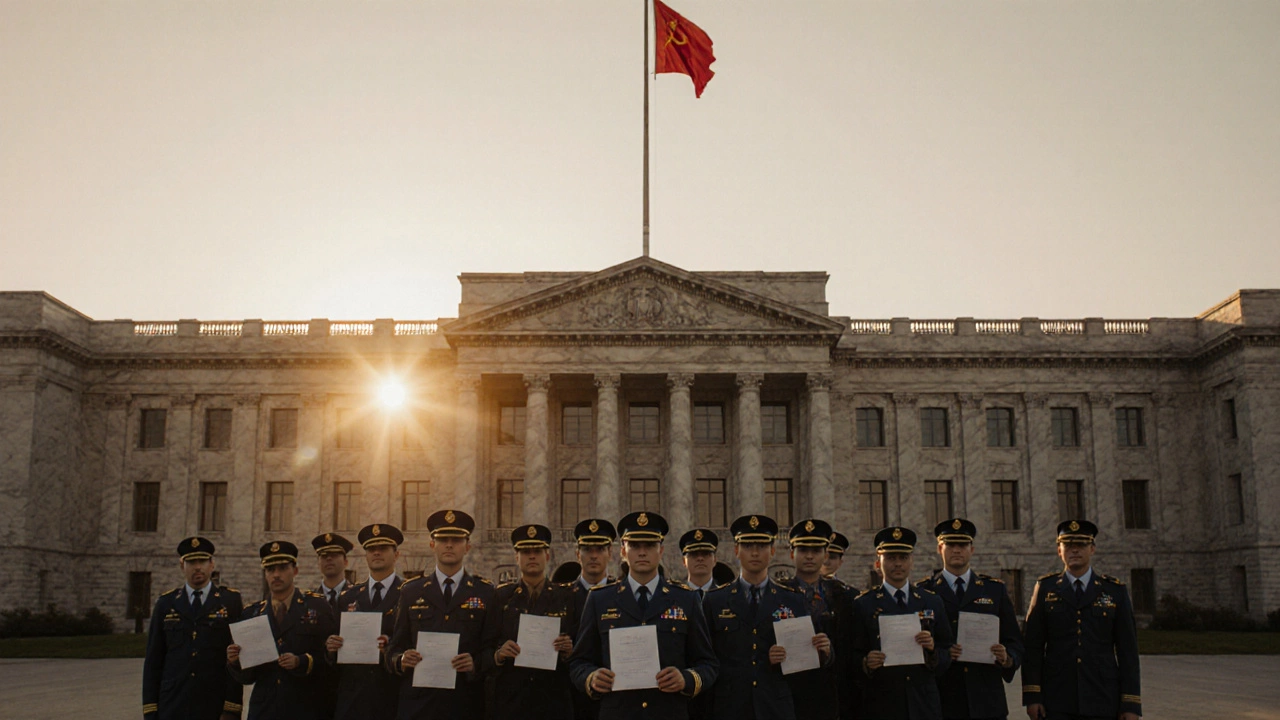Government Job Eligibility Checker
Check if you meet the basic eligibility requirements for different government job categories. This tool helps you determine which positions you might qualify for based on your citizenship, age, education, and physical fitness.
Government job is a role within federal, state, or local agencies that typically offers job security, defined pay scales, and a clear promotion pathway. Dreaming of a stable, respected career? government jobs deliver that, but the entry route can seem like a maze. This step‑by‑step guide shows you exactly what to check, where to apply, and how to prepare so you can start your government career with confidence.
What counts as government work?
Broadly, any position employed by a public authority falls under the umbrella of government work. That includes administrative officers, technical specialists, police officers, teachers in public schools, and even clerical staff in municipal offices. Each category follows its own recruitment board and exam pattern, but all share common themes: merit‑based selection, structured career ladders, and statutory benefits.
Eligibility & basic qualifications
Before you dive into a specific exam, confirm you meet the universal eligibility blocks.
- Citizenship: Most central government posts require Indian citizenship; some state posts allow NRIs or OCI holders.
- Age: Typical range is 21‑32 years, with relaxations for OBC, SC/ST, and ex‑servicemen.
- Education: A bachelor’s degree is the baseline for most administrative roles. Technical posts may demand engineering or IT degrees, while police positions often accept any graduate.
- Physical standards: Physical Test (PT) and medical fitness are mandatory for police, armed forces, and many paramilitary roles.
Choosing the right recruitment exam
The Indian public sector runs multiple examination bodies. Picking the one that matches your career goal saves months of wasted prep.
| Job Category | Key Recruiting Body | Typical Salary (₹/month) | Core Exam | Eligibility Highlights |
|---|---|---|---|---|
| Administrative Officer (IAS/IPS/IFS) | Union Public Service Commission (UPSC) | 80,000‑110,000 | UPSC Civil Services Examination | Graduates, 21‑32 yrs, no physical test for IAS |
| Sub‑Junior Clerk, Assistant | Staff Selection Commission (SSC) | 35,000‑45,000 | SSC CGL / CHSL | 12th pass (CHSL) or graduate (CGL), 18‑27 yrs |
| State Administrative Services | State Public Service Commission | 45,000‑80,000 | State Civil Services Exam | Graduates, 21‑32 yrs, state‑specific relaxations |
| Railway Officer | Railway Recruitment Board (RRB) | 50,000‑70,000 | RRB NTPC / Group D | Graduates for NTPC, 18‑30 yrs, PT required |
| Banking Officer | Institute of Banking Personnel Selection (IBPS) | 55,000‑80,000 | IBPS PO / Clerk | Graduates, 20‑30 yrs, no PT |
Identify the exam that aligns with your desired job type, then tailor your study plan accordingly.
Building a realistic preparation plan
Success hinges on organized study, not just hard work. Follow this three‑phase roadmap:
- Foundation (30‑45 days): Gather the official syllabus, download past papers, and create a subject‑wise timetable. Focus on core subjects like General Studies, English, and quantitative aptitude.
- Intensive (3‑4 months): Dive deep into each topic. Use standard reference books (e.g., Laxmikant for Polity, NCERT for History). Solve daily mock tests and track your score trends.
- Revision & Mock (1‑2 months): Consolidate notes, attempt full‑length timed tests, and analyze mistakes. Add a final week of light revision to avoid burnout.
Leverage free resources such as the National Digital Library, YouTube lecture series, and government‑issued sample papers. Paid platforms can speed up learning but aren’t mandatory.
Application process step‑by‑step
Once you’re ready, the online portal becomes your gateway.
- Register on the official website: Create a user ID, verify your email, and set a secure password.
- Fill in personal details: Ensure your name matches the passport‑size photo and ID proof you’ll upload.
- Upload documents: Scanned copies of your educational certificates, age proof, and passport‑size photo (usually 3.5 × 4.5 cm, 30 KB - 100 KB).
- Pay the application fee: Fees range from ₹ 300 (SSC) to ₹ 1,000 (UPSC), payable via net banking or UPI.
- Submit & confirm: Review every field, then submit. You’ll receive a confirmation SMS with an application number-keep it safe.
Deadlines are strict; missing a window means waiting a full year.
Selection stages explained
Most government recruitment follows a multi‑stage funnel. Knowing each stage prepares you for the right mindset.
- Written Examination: Objective multiple‑choice for most posts; essay or interview for senior roles. Scoring above the cut‑off moves you forward.
- Physical Test (PT): Required for police, defence, and many technical posts. Typical tasks: 100 m dash, long jump, and basic stamina runs.
- Personal Interview: Conducted by a board of senior officers. Emphasize your motivation for public service, problem‑solving ability, and ethical outlook.
- Document Verification (DY‑PC): Final paperwork check-ensure all certificates are original and match your online data.
Clear each hurdle, and you’ll receive a provisional appointment letter.
Post‑selection: training and career growth
New recruits usually undergo a compulsory training module lasting 3‑6 months, covering ethics, law, and job‑specific skills. After training, you’re posted to a district or department. Performance reviews happen yearly, and promotions follow a time‑bound structure (e.g., 5 years for Junior to Senior Grade).

Common pitfalls & pro‑tips
Even well‑prepared candidates stumble due to avoidable mistakes.
- Ignoring official notifications: Exam dates, admit cards, and syllabus changes are posted on the recruiting board’s website. Set Google alerts.
- Over‑relying on shortcuts: Short note‑making works only for revision, not for primary learning.
- Skipping mock interviews: Practice with peers or mentors; confidence beats knowledge gaps.
- Neglecting health: Physical tests demand stamina. Incorporate cardio and strength workouts three times a week.
Quick checklist before you apply
- Confirm citizenship and age.
- Verify educational qualification matches the exam’s requirement.
- Gather scanned copies of certificates, photos, and signature.
- Subscribe to the official notification portal of your chosen exam.
- Set a realistic study timetable and start early.
Next steps after reading
Pick the exam that aligns with your dream role, download the latest syllabus, and register for a free mock test this week. Momentum is the biggest ally in government job preparation.
What is the minimum educational qualification for most government jobs?
A bachelor's degree in any discipline is the baseline for most administrative and technical posts. Some clerical positions accept a 12th‑grade pass.
How often are the major government exams conducted?
UPSC’s Civil Services Exam is held once a year, while SSC and State PSC exams may run twice a year depending on the board’s schedule.
Can I apply for a government job if I’m over the age limit?
Age relaxations exist for OBC, SC/ST, ex‑servicemen, and disabled candidates. Check the specific notification for exact limits.
Do I need a physical test for all government positions?
No. Physical tests are mandatory for police, defence, and many technical posts but not for pure administrative roles like IAS or clerical jobs.
What are the best free resources for UPSC preparation?
NCERT textbooks, UPSC’s official syllabus PDF, past year question papers from the UPSC website, and the National Digital Library are excellent free sources.
